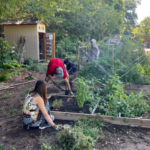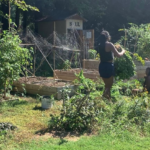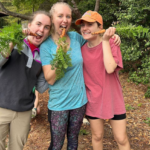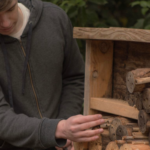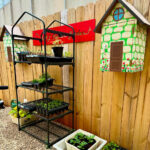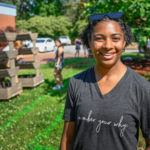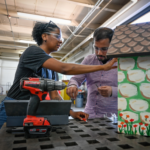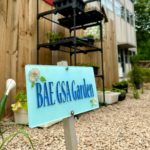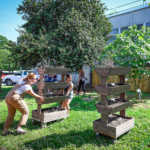NC State’s Edible Gardens
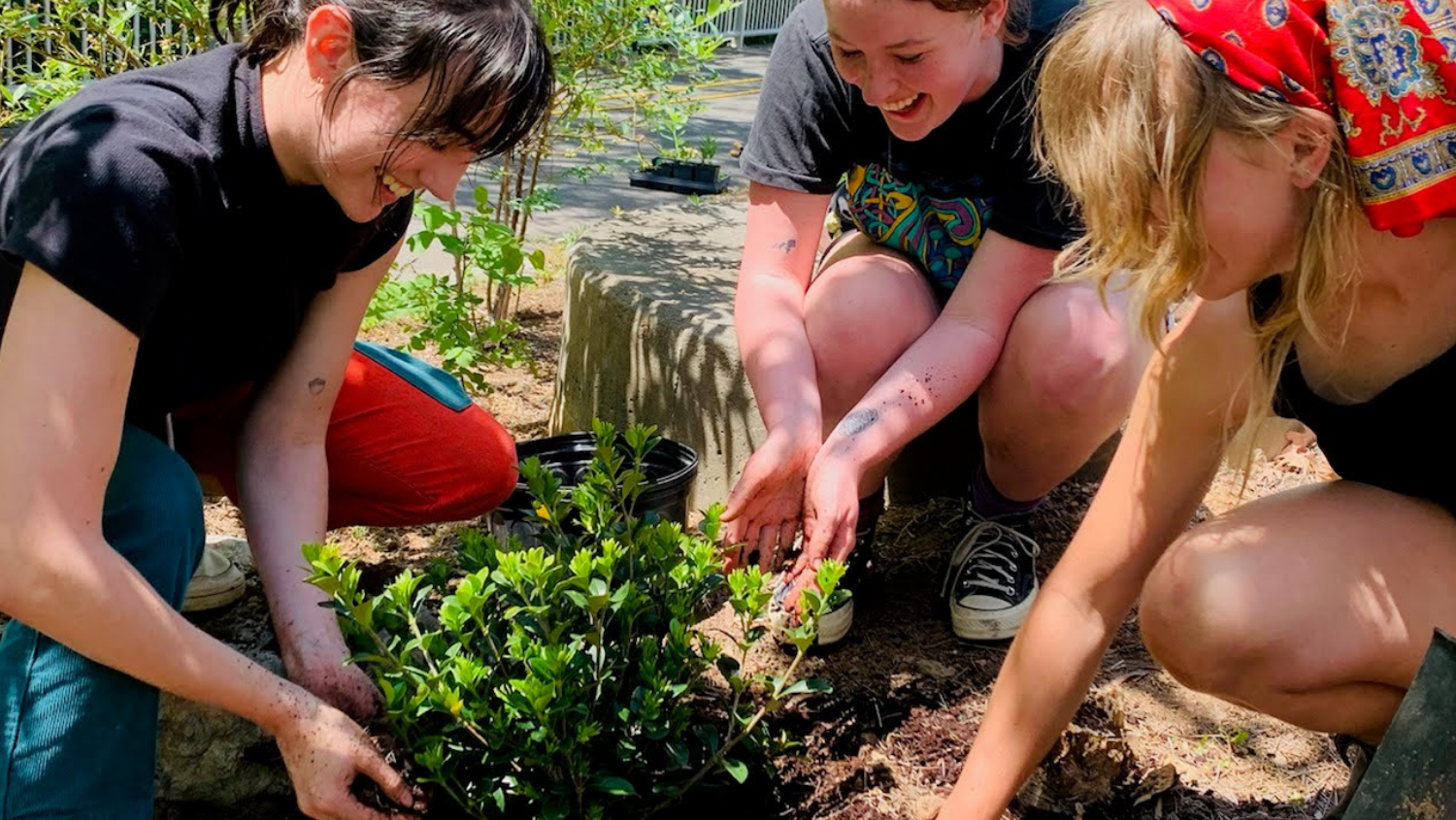
The following article was written by Campus As A Classroom student interns Haley Pierce and Ren Rooney.
Edible garden spaces offer a wide range of benefits, including community engagement, biodiversity conservation, and providing habitat for many different beneficial insects.
Pollinators, such as bees, butterflies, flies, wasps, beetles, moths and more help carry pollen from flower to flower and allow for fertilization and plants to fruit. These landscapes can also mitigate carbon emissions, reduce chemical usage and bolster population stability through eco-friendly practices.
Campus edible gardens serve as incredible educational tools to foster deeper understanding of sustainable agricultural and horticultural practices among students. They also offer places to relax, connect to nature, build community and improve mental health. Produce from edible gardens can promote food security and healthier lifestyles.
Explore NC State’s Edible Gardens:
Agroecology Education Farm
The NC State Agroecology Education Farm is located off of Lake Wheeler Road near Historic Yates Mill Park. The farm was started in 2005 as a space for the NC State community to learn about and become involved in sustainable agriculture. Since 2013, they’ve sourced produce for NC State Dining, bringing agroecology education into the dining halls as part of a closed-loop system between the farm, the dining halls and the NC State Compost Facility and Research Cooperative.
There are plenty of opportunities to become involved at the Agroecology Education Farm. Faculty can bring classes to the farm for field trips, student groups can take tours, and the farm also offers research plots and internships to support continued learning. The farm also hosts volunteer workdays and special events, including yoga.
The Agroecology Education Farm cycles through planting, harvesting and preparing crops for each new season, including:
- Early spring transplants: broccoli, brussels sprouts, beets, cauliflower, herbs, lettuce, flowers
- Spring harvesting: radishes, carrots, beets, kale, swiss chard, peas, lettuce, spinach
- Spring planting: beans, onions, potatoes
- Summer harvesting: squash, peppers, tomatoes, melons,
- Overwintering: carrots, spinach, garlic, beets, radishes, turnips, kale, swiss chard
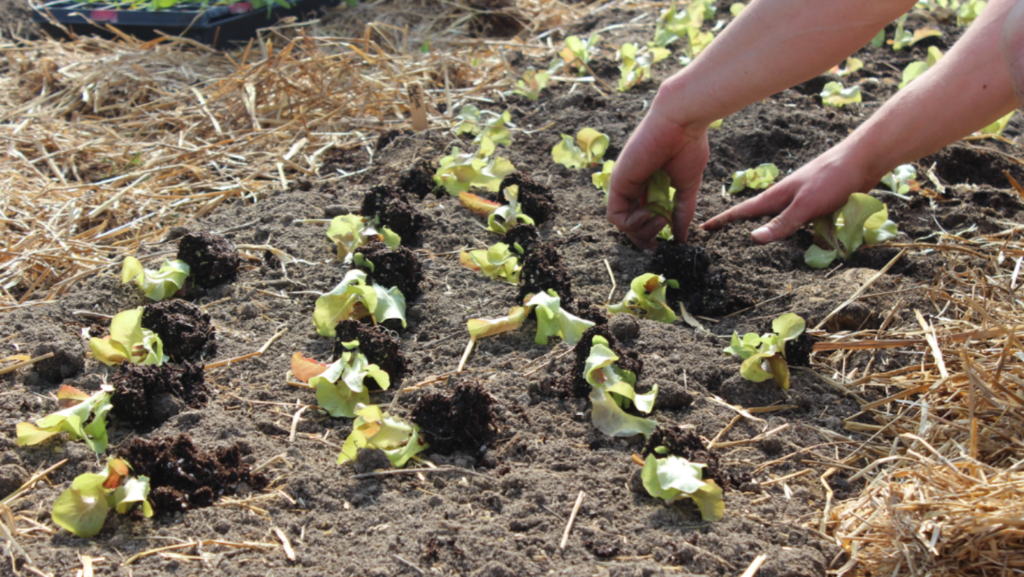
Rocky Branch Learning Garden
The Learning Garden at Rocky Branch Trail is located between the Carmichael Gym’s outdoor basketball courts and the Campus Health Center parking lot. It was designed and planted by horticulture students in 2016 with support from the City of Raleigh’s Advocates for Health in Action.
Additions to the garden’s edible features were later added by the Sustainability Stewards in 2022 with support from NC State’s Landscape and Maintenance Operations horticulture team. This team provides sustainable management of campus pollinator gardens. This includes not using any fertilizers or chemicals. Instead, they top the plant beds with compost to teach spring and fall and manually remove weeds.
The Learning Garden includes the following plants:
Edible plants: Fig, Asian Persimmon, Lavender, Strawberry, Pawpaw, Rosemary, Gardenia, Viburnum, Garlic Chives
Pollinator plants: Butterfly Weed, Tickseed, Purple Coneflower, Beebalm, Black-eyed Susan, American Aster, Mexican Sage, Mexican Marigold
SOL (Students for Organic Living) Garden
The SOL Garden is a student-run organization located near Parents Park behind Lee Residence Hall. Its mission is to “create an educational and demonstrative garden where students, faculty and visitors can learn about small-scale agriculture/ sustainable gardening, as well as to cultivate a place of serenity and community for those looking to escape the hustle of life on a college campus.”
The SOL garden strives to maintain sustainable gardening practices and includes a backyard composting bin and bee hotel created in collaboration with the NC State Beekeepers Club.
There are four raised beds where members produce different fruits, vegetables and wildflowers. The group also partners with Feed the Pack Food Pantry for excess produce donations.
The SOL Garden includes the following plants:
- Spring/summer beds: tomatoes, peppers, cucumbers, zucchini, okra, green beans, basil, marigolds, cilantro, strawberries, mint and pumpkins
- Fall beds: peas, arugula, carrots, lettuce, kale, broccoli, beets, swiss chard and celery
- Perennial plantings around beds: Black Eyed Susans, carpet bugle, thyme, lavender, rosemary, oregano, hellebores, fothergilla, cone flowers, yarrow, beautyberry, pink muhly grass and stonecrop
Department of Biological and Agricultural Engineering (BAE) P.E.E.R.Garden
The BAE P.E.E.R. Garden, or People Ecologically Engineering a Regenerative Garden, is a community demonstration garden that highlights regenerative agricultural practices in agricultural engineering.
The purpose of this initiative is to highlight indigenous agricultural practices, horticultural components of agricultural engineering and the benefits of urban food production. The small-scale garden projects allow students to implement their BAE curriculum while also preparing them to construct their own gardens one day. The BAE P.E.E.R. Garden also hopes to improve student mental health by reconnecting engineers with a natural space near their academic buildings..
The BAE P.E.E.R. Garden includes the following plants:
- Pollinator plants: White-hearted Asters, Goldenrod, Milkweed, Black Eyed Susan, Coneflowers, Joe-pye Weed
- Oriental grasses: shrubs, feather-reed grasses, bluestem
- Edible plants: strawberries, watermelon, squash, tomatoes, marigolds, bell peppers, banana peppers
Campus Foodscaping
Foodscaping provides a unique, beautiful look to decorative areas, with the added bonus of growing produce items to enjoy. Foodscaping at NC State is just taking root on campus and can currently be found in planters outside Hill Library’s Atrium.
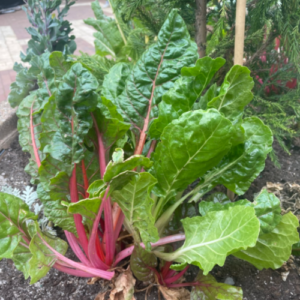
Edible gardens play an essential role in supporting the environment, food production and overall wellness. By fostering this relationship at NC State, campus edible gardens can cultivate a healthier, more resilient future for all. Learn more about growing edible gardens with NC State Extension and explore NC State’s campus environment at go.ncsu.edu/sustainablecampus.
